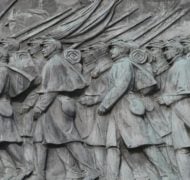End Times Disaster and Deliverance (Revelation 6-16)
Bible Commentary / Produced by TOW Project
John Greenhill: Businesses That Stand Out Do Good Even When It Costs Them |
God’s plan to advance his kingdom, however, takes a surprising turn: before deliverance comes disaster. Yet it is perhaps not so surprising as all that. Chapters 6–16 are most reminiscent of the paradigmatic episode of God’s deliverance of his people, the Exodus from Egypt. Water turning to blood, locust plagues, darkening of the heavenly bodies—all these mark out that God is bringing about the end-times exodus of his people from the latter-day Pharaohs who oppress them. Again, whether we imagine this as largely in John’s day or at some point in the future does not take away the basic point. God’s ways are consistent from age to age; the patterns of history repeat as God works his way toward the new heavens and new earth.[1]
The importance of this for the workplace is profound. Let us take the well-known four horsemen of the Apocalypse (Rev. 6). It is generally agreed that they represent War and its devastating consequences of death, famine, and plague.[2] Especially of interest for us is the notice in 6:6, “I heard what seemed to be a voice in the midst of the four living creatures saying, ‘A quart of wheat for a day’s pay, and three quarts of barley for a day’s pay, but do not damage the olive oil and the wine!’” While the notice about the oil and wine is obscure (it may signify that the judgment is only partial[3]), the prices of the wheat and barley are clearly inflated (Aune says it is eight times the normal price of wheat and five and one-thirds times the normal price of barley).[4]
While this could be referring to some future devastation, the cycle is all too familiar to every generation—humanity’s inability to get along peaceably leads to horrific economic consequences. Since Christians are caught up in these sufferings (see the fifth seal, Rev. 6:9–11), we must face the fact that our work and workplaces are often subjected to forces beyond our control. As awful as these forces may be, however, another message of Revelation 6 is that they are under God’s control. To the extent that we are able, we must strive to create workplaces where justice is upheld and where people can experience the blessing of developing the gifts God has given them. But we must also recognize that God’s providence permits catastrophes to enter our lives as well. Revelation encourages us to look to the ultimate destination of the New Jerusalem in the midst of an often bumpy road.
There is also perhaps an implicit challenge in 6:6 to avoid exploiting the vulnerable in the time of need. Economic realities may require price hikes in a crisis, but that is no excuse for making a tidy profit from the misery of others.
The bowl judgments in chapters 8 and 9 teach a similar lesson, though here the emphasis is on environmental disaster. Since the precise mechanics are not mentioned, the ecological devastation could perhaps involve human pollution as well as more overtly supernatural phenomena. The key is that God strikes the world in its capacity as the nurturer of idolatrous humanity. This is done not only to punish but also to wake people up to the fact that the earth is as much God’s as heaven is. We cannot engineer our way out of God’s presence. We cannot manipulate the environment to serve as a shelter from him.
As Revelation moves on, the emphasis shifts from God’s judgments on the world to the faithful witness of his people under the reign of the Beast (who may be a single idolatrous ruler at the very end of history, or the archetype of all such idolatrous rulers). It is (deliberately) ironic that the faithful “conquerors” (Rev. 2–3) are at one level “conquered” by the Beast (Rev. 13:7), though they are ultimately vindicated by God (Rev. 11:11). The suffering of the saints includes economic suffering: those who refuse the notorious “mark of the Beast” are not allowed to “buy or sell” (Rev. 13:17). The analogies with the “mark” of Ezekiel 9 suggest that the mark of the Beast is a symbol for adherence to the idolatrous (Roman?) system (“666” can render “Nero Caesar,” the consummate bad emperor). But even if one takes a more literal and futurist view, the spiritual lesson is clear: the refusal to follow the world’s system of false worship can sometimes lead to negative economic consequences for the faithful. This can happen in a greater or lesser way in any society.[5] John is not denying that following God’s ways can lead to positive economic consequences (as is clearly taught in Proverbs, for example). But in keeping with the rest of Revelation, he is saying that the forces of evil—though ultimately under God’s control—can twist things such that what should lead to blessing instead leads to suffering. Christians must always set their mind to do what is right and honoring to God, realizing that this could lead to exclusion from economic opportunity. Judgment on idolaters is certain, and no amount of financial gain is worth throwing one’s lot in with those who oppose God. This is why the Beast-followers of chapter 13 are immediately contrasted with the 144,000 of chapter 14, “in whose mouths no lie was found” (Rev. 14:5). They maintain their faithful and true witness to God no matter what.





